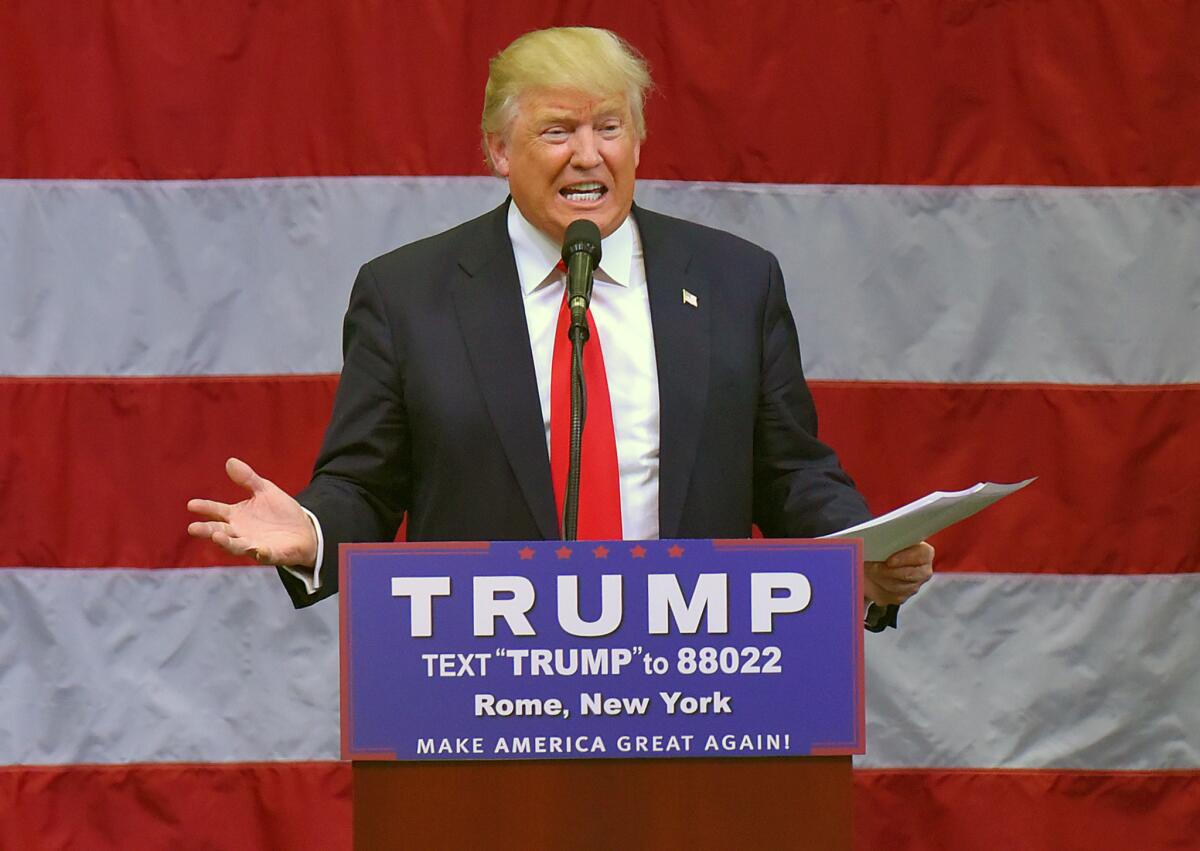Editorial: Is the GOP primary rigged?

Presidential candidate Donald J. Trump visits Griffiss International Airport during a rally to speak to supporters on April 12 in Rome, N.Y.
As a self-styled outsider candidate taking on the political establishment, billionaire casino mogul Donald Trump has always been running against the Republican Party to some degree. Lately, though, his efforts to de-legitimize the party and its rules have become more explicit.
His current grousing was prompted by the state GOP convention in Colorado last weekend, where Sen. Ted Cruz (R-Texas) walked away with all 34 delegates. This, to Trump, amounted to highway robbery. Sympathetic bloggers carped that Colorado Republicans had been denied a chance to vote (they voted only in precinct caucuses), and Trump called the GOP nominating process a ârigged, disgusting, dirty system.â
On first glance, Trumpâs complaints fit his pattern of blaming someone else each time his campaign has stumbled. The rules governing the nominating process, however, have been clear at least since last October, when each stateâs procedures for picking delegates were finalized and revealed to all the candidates. And at the moment the rules seem to be helping Cruz, who is every bit as much an anti-establishment figure as Trump. The difference between the two appears to be that Cruzâs campaign understood what Trumpâs ignored. Funny how someone who holds himself out as a masterful deal negotiator would fail to read all the way through the fine print.
If anyone can legitimately complain about the byzantine nominating process, it would be voters. Participants in a primary election or a caucus may not understand that theyâre not casting an iron-clad vote for a candidate. Their ballots tell the stateâs delegates (often chosen later at state party conventions) how to vote at the national convention, but those instructions are binding for as little as one round. If no candidate is supported by a majority of the 1,237 delegates after the national conventionâs first round, the delegates can start shifting their allegiance to rival candidates.
Recognizing the very real possibility that Trump wonât go into Cleveland with a majority, the Cruz campaign has tried to load state delegations with as many Cruz supporters as possible. That way, after the first round, it will be easier for him to round up delegates whose initial votes were pledged to Trump, Ohio Gov. John Kasich or a half dozen GOP candidates who have dropped out of the race.
Funny how someone who holds himself out as a masterful deal negotiator would fail to read all the way through the fine print.
Again, it may surprise Trump supporters to learn that the delegates he won in their states may not stay loyal to the former reality-show host when the going gets tough. Is that undemocratic? Yes, but primaries and caucuses arenât designed as exercises in direct democracy. Theyâre designed to help the national party pick a nominee with broad-based support within its ranks, on the assumption that it will improve the partyâs chances of winning in November.
Trumpâs argument seems to be that, as the longtime front-runner and the leading vote-getter, the party should hand him the nomination even if he doesnât win a majority of the delegates. But thereâs a good reason behind the majority rule: The party wants a nominee who has a chance of winning a general election. Most Republicans whoâve cast ballots thus far have voted for someone other than Donald J. Trump. Unless delegates were allowed to switch horses after the first round or two of balloting, the party would never break the looming stalemate between Trump and Cruz â another candidate opposed by most Republican primary voters â or find a consensus nominee.
The GOP finalized in September 2014 the broad framework for how states would choose delegates, and the rules for the nominating processes in each state were set in stone in October 2015. So if the party designed the process to frustrate Trump, that plot had to have been hatched long before he started winning primaries and scaring the bejeebers out of the party establishment.
By the way, the rules that will govern the convention in Cleveland in July will be set by the convention delegates, a plurality of whom will almost certainly be pledged to Trump. That voting bloc should give his campaign considerable influence over those rules â assuming that Trump is paying attention. Given what happened in Colorado, he probably will be.
Follow the Opinion section on Twitter @latimesopinion and Facebook
More to Read
A cure for the common opinion
Get thought-provoking perspectives with our weekly newsletter.
You may occasionally receive promotional content from the Los Angeles Times.










